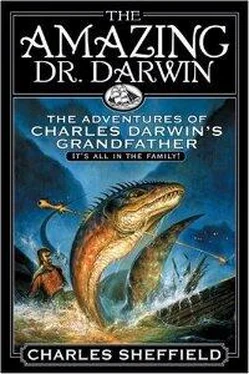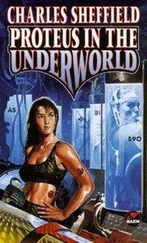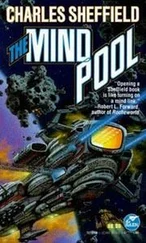It was a curious and curiously varied group. Joseph Faulkner kept an unusually egalitarian household, with a suitably unconventional seating arrangement for both guests and servants. Darwin was at one end of the table. At the far end was the host, and on Faulkner’s left sat Mary Rawlings, a thirty-year-old redhead with milky skin and a determined look in her blue eyes. She had her hand often and possessively on Faulkner’s arm. Darwin had shrugged mentally. His own views were liberal. Mary must know that Faulkner had a wife across the Atlantic, and she was surely old enough to make her own decisions.
In midtable there was an empty chair, intended for a manufacturer of agricultural equipment who had been detained by business in Norwich. He had sent his apologies, and into the vacant place Jamie Murchison’s heartache, brown-haired and blue-eyed Florence Trustrum, had slipped at the end of the meal. She quietly helped herself to preserved plums and coffee. Joseph Faulkner had no respect for the traditional class separations, and her switch from servant to diner excited no comment.
Darwin had made his own evaluation of Florence as she supervised the serving of dinner, and decided that she was as healthy, vigorous, and straightforward a specimen of womanhood as he was likely to find in London. Imaginary ailments were as far from her life as the surface of the moon, and that made Jamie Murchison’s remarks all the less credible.
Across from Florence sat Richard Crosse, who according to Murchison had visited her room but seen and heard nothing out of place. Seated between Colonel Pole and his deaf aunt, Crosse was a thin and intense young man in his middle twenties, slightly crookbacked and with one shoulder higher than the other. Somewhere in status between a paying lodger and a guest, he had kept his attention on his plate right through dinner. Only now did he turn dark, intelligent eyes toward Darwin.
At the end of the recital of the afternoon’s events there was a respectful silence. “So you see,” Darwin concluded, “there are five mysteries, with five questions to be answered. What thoughts do you have on any of this?”
There was another long silence. “Come now,” Faulkner said. “Theories. What about you, Richard? You are always full of wild ideas, and the only time you pulled your nose out of your studies this week, it was to tell me how excited you were about Dr. Darwin’s visit. You must have something to offer.”
Crosse shook his head, and turned beseechingly from Faulkner to Darwin. “I—I’m afraid that I—”
“No one is obliged to provide comment.” Darwin came to the rescue. “I told you, Joseph, that all I have to offer is questions. It would be no surprise if others find themselves in the same position.”
At the end of the table, Mary Rawlings was frowning and scratching the end of her snub nose with her forefinger. “Would you entertain the idea not of an answer, but perhaps of a sixth mystery?”
“Gladly. Consideration of new questions often allows us to answer old ones.”
“You never visited the exhibition, did you, and never saw the Heart of Ahura Mazda?”
Darwin shook his head.
“So you have been assuming that Daryush Sharani escaped from the locked hall in the same way as the would-be thief entered it, through an open window.”
“That is true.” Darwin was frowning. “It was my assumption, but it seems a reasonable one. On the evidence of witnesses he was certainly present at the exhibition when it closed, at three o’clock, and certainly absent when the watchman opened the doors.”
“It would be a good assumption—if Daryush Sharani resembled other men in his appearance. But he did not!” Mary Rawlings looked around the table for confirmation, and others nodded agreement. “He wore the most ornate and elaborate robes of scarlet and purple, and a tall red headdress. He also had a huge beard, big and black and bushy. There is no way that he could appear on the streets of London, even for two minutes, without being seen and remarked on by a score of people. Unless perhaps his clothes were found in the hall?”
“They were not.” Darwin was looking at Mary Rawlings in admiration. “Young lady, rem acu tetigisti . You have put your finger on an absolutely crucial point. No clothes were found, nor the great ruby, the Heart of Ahura Mazda. Nor, for that matter, the day’s takings from the Exhibition, which were supposedly in excess of five pounds.”
“So this man Sharani became disembodied ,” said Jacob Pole at last. “Hm. Went up into thin air. I’ve seen a trick like that once or twice in India, but I never thought to see it in London.”
“Nor will you.” Darwin roused himself and snapped his fingers. “Rather the opposite. Ah, what a fool I am! I did not have the sense to observe the results of my own actions.” He turned to his host. “Joseph, do you have a carriage available?”
“Of course. But why? You cannot be leaving already, when it’s not yet nine o’clock.”
“I must.” Darwin stood up. “I must go back to the Exhibition, to demonstrate to myself that I am indeed an imbecile—and would have remained one, but for the valuable assistance of this company. And anyone who cares to come with me will observe the evidence of my folly.”
* * *
The afternoon’s foggy damp had been succeeded by a hushed and relentless rain, enough to keep anyone indoors with no urgent reason to be abroad. The interior of the coach was drafty and wet, but Darwin was in high spirits.
“The true disgrace is that I noticed it!” he said, as they clattered through empty streets toward the Thames. “And yet I did not apprehend its significance. When I was in the hall, I banged my stick on the stone floor, and remarked even then that the sound was strange. There was a boom to it, like an echo. I thought to myself, ‘Rafters,’ but the timbre was wrong. The echo was— under the floor!”
Five of them were riding the coach. Joseph Faulkner had not asked who else might be going with Darwin—he was, and that was the main thing. Mary Rawlings had shown as much determination, grabbing Faulkner’s arm so that he could not move without towing her along. The fourth in the coach was Jacob Pole. Scenting an adventure, with perhaps a priceless ruby at the end of it, he had arranged for his aunt to be taken home without him. She seemed puzzled, but made no objection. Last came Richard Crosse. He had swung aboard uninvited, sitting up next to the coachman in the pouring rain and as jittery as ever. He leaned over to look inside the coach, seemed on the point of a flood of speech, then as suddenly sat upright again.
The rapid night ride took less than five minutes, and at the hall Darwin bustled on ahead of the others. He stood before the great double doors, lantern in hand, and cursed mildly.
“Ahriman’s ghost! Padlocked again—when now there is nothing to steal.” He turned to Richard Crosse. “You are more limber than I. The back window, then, and unbolt the side door.”
Crosse melted away into the darkness without a word. Thirty seconds later there was a rattle of bolts, and Darwin could stride inside. He walked five paces, wiped his forehead with his sleeve, and held the lantern high. “Do you see it? What we seek, of course, is some way down through a solid stone floor.”
It was Mary Rawlings who found it, over in one dark corner of the hall. The hinged wooden trapdoor had been painted grey and sanded over, so that it resembled stone flags. When it was lifted she hung back, nervous for the first time, but Darwin unhesitatingly swung the panel full open and peered down. He listened intently. A moment later he had laid the lantern on the floor and was descending into blackness.
Читать дальше












